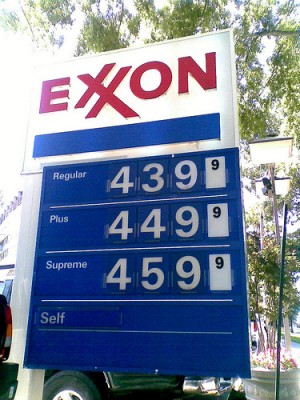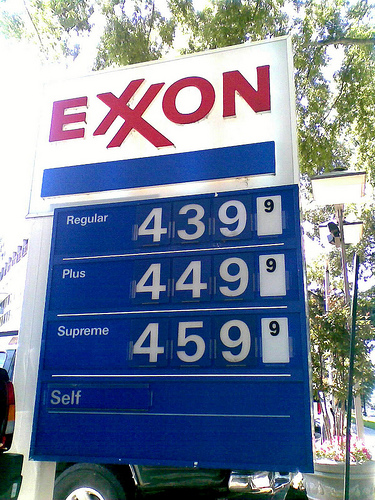
As Boston University students plan their exodus from the Charles River campus this spring, gas prices are reaching new highs, leading the President and Congressional leaders to seek political solutions to Americans’ gas woes. Unsurprisingly, President Obama and Republican leaders have different ideas about how to soften the blow, but perhaps the question should be not how to lower gas prices but whether to lower gas prices.
According to the U.S. Department of Transportation’s 2008 data, the federal gas tax stands at eighteen cents a gallon. States can add their own taxes to gasoline. Data released by the American Petroleum Institute in January of this year showed that no state in the union allowed drivers to get away from the pump paying less that thirty cents a gallon in taxes. These taxes, combined with the United States’ dependence on foreign oil have pushed average gas prices close to the four dollar mark nationally, and well above that level in some states.
Forbes writer Christopher Steiner said on the radio show The Take Away that Americans will start to change their behavior – driving less, carpooling, following the speed limit instead of going ninety on the freeway – as the price of gas approaches four dollars a gallon. A less-discussed reaction to that benchmark is that political actors will start to change their behavior, too.
Raising the gas tax in the nation of freedom, big cars, and the open road is political suicide, so people trying to influence the cost of gasoline are forced to try to find other solutions. Exxon Mobil posted a $10.7 billion profit for the quarter last week, representing a 69% increase from a year ago, according to the Washington Post. President Obama has recently attacked the huge tax cuts and subsidies awarded to big oil companies. Predictably, Republicans have been generally opposed to ending the subsidies to oil companies, which amount to billions of dollars a year. According to Politico, Speaker of the House John Boehner expressed some willingness to end the tax initiatives, but quickly changed his mind when he realized he was agreeing with the President.
Obama’s other big idea is to offset gas prices by increasing spending on alternative energy. Again, this is not a solution for someone who wants to drive across the country in the next four months. Investment in alternative energy is expensive and time consuming. Any new technology that is developed takes years to reach consumers, and even when it does it is not an immediate replacement for old technology. New electric cars like the Chevy Volt are great innovations, but they still can’t drive halfway across the continent on two charges the way a traditional car can on two fill-ups.
The reason that there is no policy solution that can end high gas prices in America is that gas prices in America are actually relatively low. Even at the four dollar a gallon threshold, a gallon of gasoline is cheaper than a fancy bar of chocolate or a sandwich or a small popcorn at the movie theater. All of those are available in a renewable supply, while oil is a finite resource that may already have reached its peak.
The fact that Europeans pay significantly more for gasoline than Americans has had a hand in the drastically different consumption patterns many Europeans engage in. According to CNN, most European countries pay more that five U.S. dollars per gallon of gasoline, with the Netherlands and Norway paying more than six dollars. Europeans also have much stronger rail systems that are far more heavily used than Amtrak, the United States’ half-hearted attempt at national rail.
Raising the gas tax, at this point, may prove useless. If the gas tax were raised today to mirror European levels, Americans outside of city centers would be left stranded with no public transportation infrastructure to support those who could no longer afford to drive. However, lowering gas prices is also not the answer. Rather, political energy should be spent on coming up with a comprehensive solution to America’s lack of public transportation infrastructure. If public transportation is gradually extended to more Americans, perhaps rising gas prices will not have to represent a political and economic crisis, and responsible, affordable consumption of natural resources will become the new American legacy.


Howdy, can any person suggest a method to stop this website from showing a javascript pop-up in Internet explorer? Thanks
We’ll look into it, thank you for the notification.